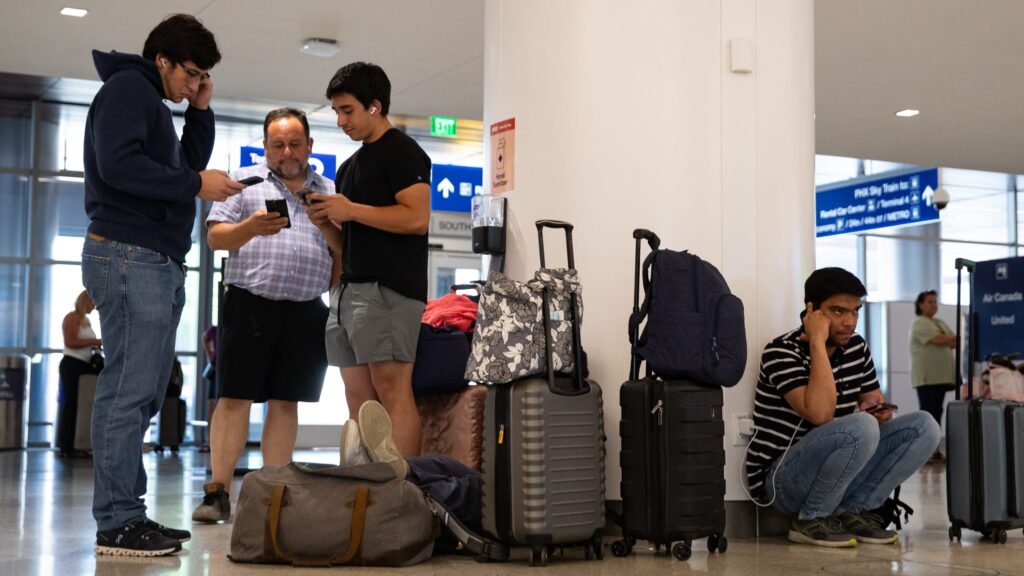The U.S. Department of Transportation’s new refund rules for air travelers require automatic refunds if flights are significantly delayed or cancelled. If your domestic flight is delayed for more than 3 hours and your international flight is delayed for more than 6 hours, you will be eligible for a full refund. Airlines must issue refunds within 7 days. 2 days for credit card purchases and 20 days for other payment methods. It is also mandatory to refund checked baggage fees if the package is not delivered within the stipulated deadline or in the case of non-functional or unavailable paid services such as Wi-Fi.
The Department of Transportation’s new refund rules for air travelers are now fully effective.
If your flight is canceled or delayed for more than 3 hours on domestic itineraries and more than 6 hours on international itineraries, you are automatically entitled to a refund.
When the regulations were announced this spring, Transportation Secretary Pete Buttigieg said in a statement: “Passengers who owe money to airlines deserve to get their money back without the headache or haggling.” “Our new rules set new standards that require airlines to promptly issue cash refunds to passengers.”
Some of the DOT’s new rules went into effect as early as May, when Federal Aviation Administration funding was reauthorized, but some provisions took longer to take effect. In a letter to airline executives in July, Buttigieg emphasized what the new rules mean for travelers and airlines.
Here’s what travelers need to know about how the new rules work and what rights they have.
Refund for canceled flights
Even before the new rules were announced, the DOT required airlines to provide refunds to travelers whose flights were canceled only if they chose not to take an alternative flight offered by the airline.
DOT’s policies clarify when and how these refunds must be processed. The latest guidelines require airlines to issue refunds automatically without passengers specifically requesting them. Airlines and ticket agents must complete refunds within seven days for credit card purchases and 20 days for other payment methods.
Refunds must be made to the original method of payment. If your ticket is not paid for in that manner, you will not be able to receive a refund on your ticket or credit. Additionally, refunds must cover the full, unused amount of the ticket. Airlines are not required to issue refunds for segments of the itinerary that were already operated before the trip was canceled.
Cruising Altitude: Did you fall out of the plane? What the airline owes you and why it’s nothing.
Refund for delayed flights
A bigger change to DOT’s policy is how it clarifies what is considered a significant delay. While the previous policy was vague, the new rules state that delayed flights are eligible for a refund after three hours for domestic itineraries and six hours for international itineraries. These time limits apply to both departure and arrival delays.
The policy also covers flights that are “substantially modified,” which the DOT describes as “departures or arrivals from another airport, an increase in the number of connections, passengers being downgraded to a lower class of service, or The company explains that it means “transfer at an airport or flight.” You will need to board a separate plane that is difficult to access and accommodate people with disabilities. ”
All refund guidelines regarding cancellations also apply to flight delays. This means that refunds must be issued automatically in full to the original payment method.
Refunds due to baggage issues
Passengers will also be entitled to a refund of checked baggage fees if their luggage does not arrive at its destination on time. The DOT’s new rules require passengers who have alleged baggage mishandling to have their baggage removed if their baggage is not delivered within 12 hours for domestic itineraries and 15 to 30 hours for international itineraries, depending on the length of the flight. Fees will be refunded. .
Airfare refund
DOT rules also require airlines to pay for services such as in-flight Wi-Fi, seat assignments, and in-flight entertainment that don’t work or are unavailable during the flight, even though passengers pay for them. We are obligated to issue a refund.
Medical and government travel exemptions
Additionally, if a passenger is restricted by a government or advised not to travel by a medical professional due to being diagnosed with a serious infectious disease after booking a ticket, passengers will soon be able to travel on an airline that is valid for at least five years from the date of issue. You will also be entitled to receive credits. According to DOT policy, airlines can require passengers who apply for the credit to provide documentation to support their claims. This part of the policy will not fully take effect until May.
(This story has been updated to correct a spelling/typo error.)
Zach Wictor is a travel writer for USA TODAY based in New York. Please contact us at zwichter@usatoday.com.

